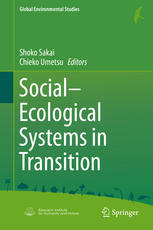

Most ebook files are in PDF format, so you can easily read them using various software such as Foxit Reader or directly on the Google Chrome browser.
Some ebook files are released by publishers in other formats such as .awz, .mobi, .epub, .fb2, etc. You may need to install specific software to read these formats on mobile/PC, such as Calibre.
Please read the tutorial at this link: https://ebookbell.com/faq
We offer FREE conversion to the popular formats you request; however, this may take some time. Therefore, right after payment, please email us, and we will try to provide the service as quickly as possible.
For some exceptional file formats or broken links (if any), please refrain from opening any disputes. Instead, email us first, and we will try to assist within a maximum of 6 hours.
EbookBell Team

5.0
68 reviewsThis book presents an overview of current knowledge about social–ecological systems (SESs), a productive new field dedicated to understanding the relationships between human society and nature. To make the reader aware of how SESs are necessary to maintain our society, the book begins with a broad perspective about what social–ecological systems are and what the related research issues in this field are as well. The second part discusses how human activities have changed ecosystems from temperate grasslands to tropical areas. The third part focuses on the adaptability of societies to unpredictable fluctuation in ecosystems, while the last part summarizes factors for the resilience of society against social and ecological shocks. Human activities have severely degraded most natural ecosystems, which are now in critical condition. Various approaches have been developed to improve the SESs, to understand environmental problems and explore better ways to increase the sustainability both of ecosystems and of human societies. However, a clear perspective on how to address such problems is still lacking. Part of the difficulty arises because of the diversity and complexity of ecosystems and human societies. Another important factor is the effect of extremely rapid changes in the social and economic characteristics of social–ecological systems. Consequently, adaptability and resilience clearly are essential for the sustainability of SESs. Although there is no one, direct method to achieve high adaptability and resilience, a possible way is to compare and understand the diverse problems associated with differing social–ecological systems. This published work makes a useful contribution to a greater understanding of the way that essential social responses linked to changes in ecosystems can potentially stimulate further research on this important and interesting subject. The book will attract the attention of scholars in environmental sciences, ecology, and sociology, and indeed of anyone interested in the concept of social–ecological systems.